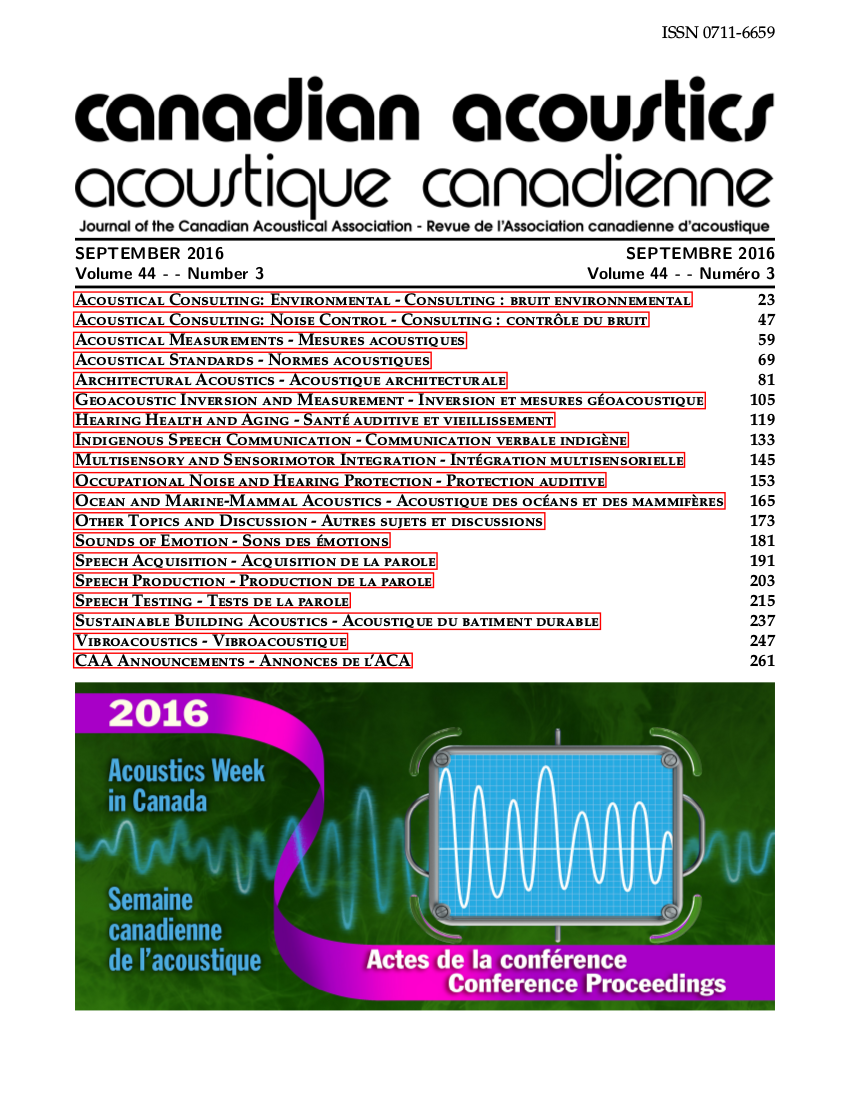Intelligibility of older talkers on the NU6 test
Abstract
The stimuli used in laboratory studies on speech perception tend to be produced by younger talkers in ideal conditions. However, talker characteristics are much more variable in the real world, and include changes in speech due to normal aging and changes due to the environment. The first goal of this study was to investigate how the characteristics of older talkers affect listeners on a speech intelligibility test. The second goal was to investigate the extent to which older talkers can improve their intelligibility in a difficult communication situation. Eight healthy older talkers were selected who varied on their natural speech and voice characteristics. Talkers recorded the NU6 test in four conditions: speaking normally in quiet and in babble noise, and speaking as if to a listener with hearing loss in quiet and in babble noise. These recordings formed a new set of test materials that incorporated differences in talker characteristics as well as differences due to the communication environment. Young adult listeners with normal hearing were tested on these recordings in babble noise at -2 dB SNR. Listeners performed better on word recognition when talkers spoke in noise than when talkers spoke in quiet. Speech spoken as if to someone with hearing loss did not lead to better word recognition accuracy than speech spoken normally. Talkers varied on their overall intelligibility, with a range of 18 percentage points between the least and most intelligible talkers. Talkers were able to increase their intelligibility to the same extent when speaking in noise, regardless of their baseline intelligibility. Therefore, the characteristics of older talkers may dictate their baseline intelligibility, but they do not limit the extent to which talkers can increase intelligibility by changing their speech production.
Additional Files
Published
How to Cite
Issue
Section
License
Author Licensing Addendum
This Licensing Addendum ("Addendum") is entered into between the undersigned Author(s) and Canadian Acoustics journal published by the Canadian Acoustical Association (hereinafter referred to as the "Publisher"). The Author(s) and the Publisher agree as follows:
-
Retained Rights: The Author(s) retain(s) the following rights:
- The right to reproduce, distribute, and publicly display the Work on the Author's personal website or the website of the Author's institution.
- The right to use the Work in the Author's teaching activities and presentations.
- The right to include the Work in a compilation for the Author's personal use, not for sale.
-
Grant of License: The Author(s) grant(s) to the Publisher a worldwide exclusive license to publish, reproduce, distribute, and display the Work in Canadian Acoustics and any other formats and media deemed appropriate by the Publisher.
-
Attribution: The Publisher agrees to include proper attribution to the Author(s) in all publications and reproductions of the Work.
-
No Conflict: This Addendum is intended to be in harmony with, and not in conflict with, the terms and conditions of the original agreement entered into between the Author(s) and the Publisher.
-
Copyright Clause: Copyright on articles is held by the Author(s). The corresponding Author has the right to grant on behalf of all Authors and does grant on behalf of all Authors, a worldwide exclusive license to the Publisher and its licensees in perpetuity, in all forms, formats, and media (whether known now or created in the future), including but not limited to the rights to publish, reproduce, distribute, display, store, translate, create adaptations, reprints, include within collections, and create summaries, extracts, and/or abstracts of the Contribution.


